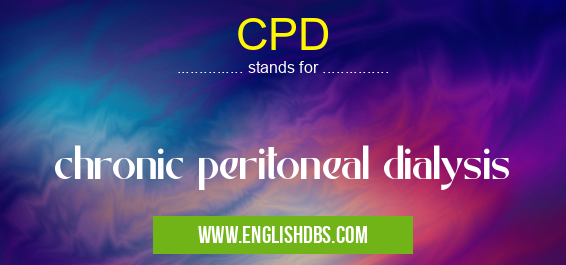What does CPD mean in BRITISH MEDICINE
CPD stands for chronic peritoneal dialysis, which is a type of treatment used to manage end-stage kidney failure. CPD is a long-term and relatively low-cost option for dialysis patients. It enables the patient to take more control over their care and encourages more freedom in his or her everyday life.

CPD meaning in British Medicine in Medical
CPD mostly used in an acronym British Medicine in Category Medical that means chronic peritoneal dialysis
Shorthand: CPD,
Full Form: chronic peritoneal dialysis
For more information of "chronic peritoneal dialysis", see the section below.
Essential Questions and Answers on chronic peritoneal dialysis in "MEDICAL»BRITMEDICAL"
What is CPD?
CPD is an abbreviation for chronic peritoneal dialysis, which is a type of treatment used to manage end-stage kidney failure.
How does CPD work?
The process of Chronic Peritoneal Dialysis involves using the lining of the abdomen (peritoneum) as a filter for removing waste products from your blood when your kidneys no longer can perform that function naturally. This works by filling the abdominal cavity with a sterile fluid known as dialysate through a catheter inserted in your abdomen and allowing the fluids to remain in contact with the peritoneum for several hours each day so it can absorb waste from your body.
Who is suitable for CPD?
CPD may be appropriate for people with end stage renal disease who are not able to undergo hemodialysis or who do not want to go through this type of treatment. People who have unstable blood pressure or significant comorbidities such as heart disease may also be better suited for this treatment option.
What are the benefits of CPD?
CPD offers many potential benefits, including improved quality of life due to greater flexibility, convenience, independence and improved nutrition status as well as reduced hospitalizations and complications associated with hemodialysis related infections compared to hemodialysis treatments. Furthermore, it requires fewer office visits than hemodialysis which may lead to cost savings due to fewer doctor's appointments and tests required during dialysis treatment.
What risks are associated with CPD?
While CPD has numerous advantages it also has some possible risks associated with its use such as infection at the site where the catheter enters into your body and peritonitis (inflammation of the abdomen). Additionally there may also be problems related to electrolyte balance if too much or too little water is removed from your body during dialysis treatments. It's important to discuss any potential risks with your healthcare provider before starting any form of dialysis therapy.
Final Words:
Chronic Peritoneal Dialysis (CPD) can be an effective way of managing end-stage kidney failure offering patients greater control over their care as well as improved quality of life compared traditional forms of dialysis such as haemodialysis that require more frequent visits to hospital clinics. However, risks associated with its use should be discussed with a healthcare provider prior to receiving any form of dialysis therapy.
CPD also stands for: |
|
| All stands for CPD |
